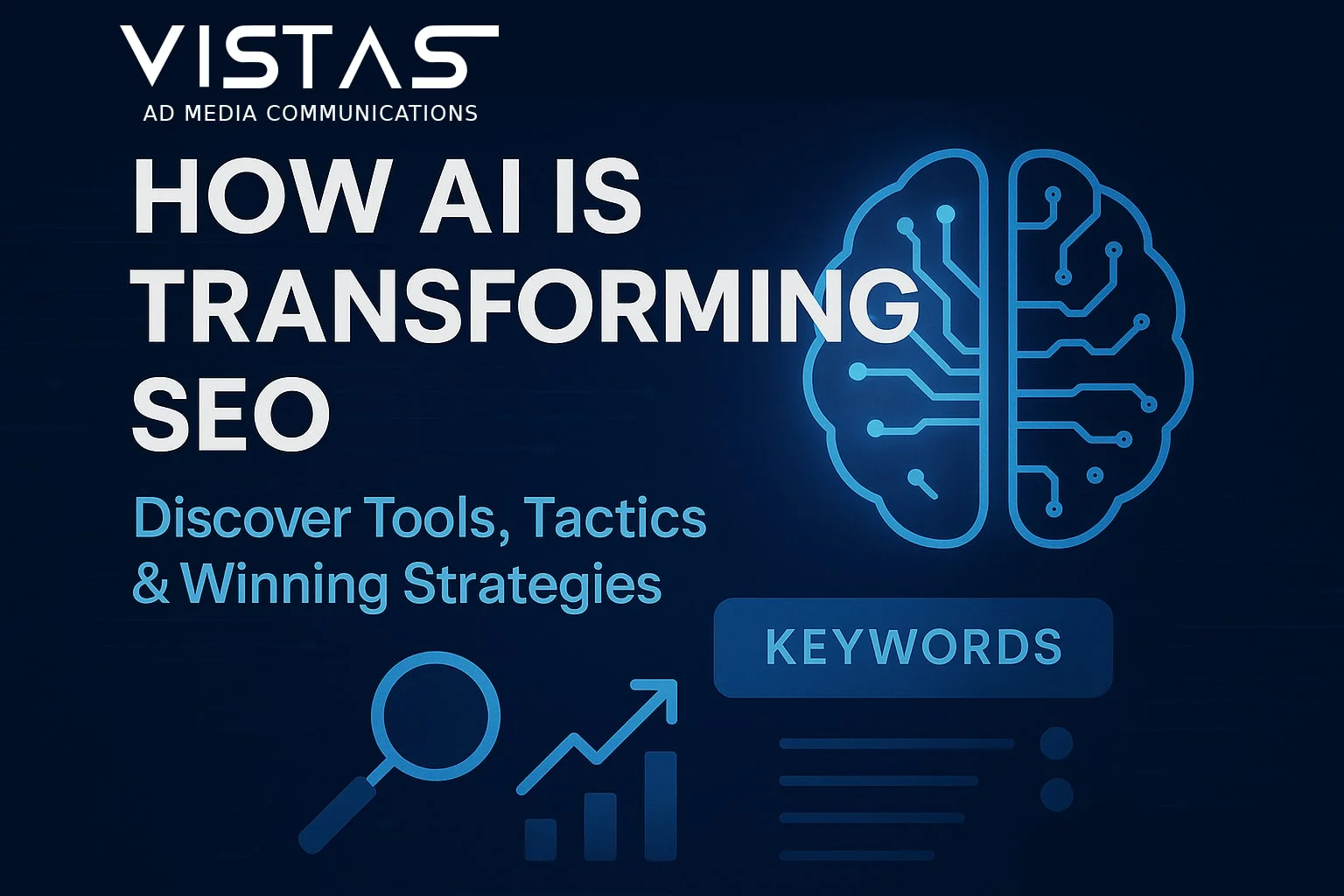The Future of SEO is Here Explore How AI is Changing Search Forever

Strong 8k brings an ultra-HD IPTV experience to your living room and your pocket.
How AI is Transforming SEO: Tools, Tactics, and What Top Brands Are Doing Differently
Search Engine Optimization (SEO) has always been dynamic, but the advent of artificial intelligence (AI) has supercharged this evolution. From content creation to user experience, AI is reshaping how marketers approach SEO.
Integrating AI into search algorithms and digital marketing tools has not only changed the game's rules—it’s rewritten them entirely.
In this blog post, we’ll explore how AI transforms SEO, the emerging trends brands need to stay on top of, and what major companies prioritise in their strategies.
What's changed in the AI-driven SEO landscape?
AI in SEO is no longer a futuristic concept. It’s here, and it’s thriving. Here’s how:
1. Smarter Search Engines
Google's AI-powered algorithm, RankBrain, was one of the earliest signals of AI’s integration into search. More recently, BERT and MUM have made search engines more sophisticated in understanding context, search intent, and semantics. This shift means keyword stuffing is out; high-quality, intent-focused content is in.
2. Content Creation & Optimization
AI tools like ChatGPT, Jasper, and Surfer SEO are helping marketers create content faster, optimise it more precisely, and scale production without sacrificing quality. These tools analyse top-performing websites, suggest semantic keywords, and even generate content outlines—enhancing productivity and consistency.
3. Predictive SEO
AI can forecast trends, predict keyword opportunities, and anticipate user behavior. With predictive analytics, brands are now crafting SEO strategies based on future patterns, not just past data. This helps in staying ahead of the curve.
4. Voice and Visual Search Optimization
AI plays a critical role in voice and visual search technologies. Optimizing for voice search means targeting natural language queries and featured snippets, while visual search demands high-quality images with proper alt text, schema markup, and contextual relevance.
5. Enhanced User Experience (UX)
Google’s core updates have increasingly focused on website experience—load speed, mobile-friendliness, and interactivity. AI tools analyse bounce rates, heatmaps, and user flows to refine UX, indirectly improving rankings.
What is the role of AI in SEO strategies?
AI plays a transformational role in modern SEO strategies by automating tasks, improving accuracy, and helping marketers better understand user behaviour and search intent. Here's a breakdown of how AI is influencing SEO:
1. Understanding Search Intent
AI helps search engines—and marketers—interpret the intent behind user queries. Whether someone wants to buy, learn, or compare, AI can analyse patterns in data to predict and align with that intent. This means content can be better tailored to meet what users are really looking for.
2. Data Analysis and Insights
AI processes massive amounts of data quickly, spotting patterns humans might miss. It can:
- Analyse competitors
- Identify SEO opportunities
- Track ranking fluctuations
Recommend strategic actions in real-time
3. Personalization
AI enhances personalization by:
- Recommending dynamic content based on user behavior
- Delivering location-based search results
- Improving website experience using behavioral data (click paths, heatmaps, etc.)
A better user experience can lead to lower bounce rates and higher dwell time, both positive SEO signals.
4. Automation of Repetitive Tasks
AI tools can automate tasks like:
- Technical SEO audits
- Meta tag generation
- Internal linking suggestions
- Broken link detection
This saves time and ensures consistent optimization.
AI in SEO = Smarter Strategy + Faster Execution + Better Results.
By leveraging AI, marketers can stay ahead of algorithm updates, craft more effective content, and provide a better experience for users—while maximizing efficiency.
What are the best ways to implement AI tools for SEO?
Implementing AI tools for SEO effectively means more than just plugging in software—it’s about integrating AI into your overall SEO strategy to boost performance, productivity, and results without losing the human touch.
Here’s a step-by-step guide to help you do just that:
Step 1: Set Clear SEO Goals
Before using any AI tools, define your objectives:
- Do you want to increase organic traffic?
- Improve keyword rankings?
- Boost content production?
- Enhance technical SEO or UX?
Clarity in goals helps you choose the right tools and measure their impact.
Step 2: Integrate Tools with Your Workflow
- Connect tools to your CMS (like WordPress or Shopify) for easy publishing.
- Automate data pulling into dashboards using tools like Google Looker Studio or Zapier.
- Set up alerts or scheduled reports so you're always in the loop.
Integration ensures efficiency and eliminates repetitive manual tasks.
Step 3: Use AI to Create and Optimise Content
For Content Creation:
- Use AI to generate outlines, headlines, FAQs, and drafts.
- Include relevant NLP keywords and search intent.
For Optimisation:
Use Surfer SEO or Clearscope to match top SERP pages in terms of keyword density, structure, and topic coverage.
Improve readability and SEO score before publishing.
Combine AI-generated content with human editing for authenticity and depth.
Step 4: Run SEO Audits & Fix Technical Issues
- Regularly audit your site with tools like Screaming Frog or ContentKing.
- Use AI to identify crawl errors, page speed issues, or mobile UX problems.
- Prioritise fixes based on SEO impact.
- Clean websites rank better—AI helps maintain health at scale.
Step 5: Analyse and Adapt with AI Insights
- Use predictive tools to discover rising keywords or future trends.
- Track what's working and where you’re underperforming.
- Adjust your content strategy, backlink building, or page structure accordingly.
Data-driven decisions > gut instinct.
Step 6: Test, Learn, and Iterate
- A/B test titles, meta descriptions, or landing pages using AI-powered testing tools.
- Monitor performance changes after updates.
- Continuously refine your strategies based on insights.
Bonus Tips:
Train your team: Make sure everyone understands the tools and uses them properly.
Stay ethical: Avoid using AI to create spammy or misleading content.
Monitor updates: AI is evolving fast—keep learning and adapting.
Search engine optimisation and AI: challenges and opportunities
While combining AI and SEO opens up huge opportunities, it also comes with some real challenges. Understanding these can help you plan more strategically and avoid common pitfalls.
Here’s a breakdown of key challenges in combining AI and SEO:
1. Over-Reliance on Automation
The Challenge:
AI tools can create, optimise, and even publish content at scale, but too much automation can lead to generic, low-quality content that lacks originality or human insight.
Why It Matters:
Google prioritises helpful, authentic, and expert-driven content. Over-automated content might rank initially, but risks penalties or low engagement if it feels robotic or redundant.
The Fix:
Use AI to assist, not replace. Combine AI-generated content with human editing, storytelling, and brand voice to maintain quality and authenticity.
2. Keeping Up with AI-Driven Algorithms
The Challenge:
Search engines like Google are constantly updating their algorithms, many of which are now powered by AI themselves (e.g., BERT, MUM). Predicting how these changes affect SEO is becoming more complex.
Why It Matters:
What works today might not work tomorrow. Traditional SEO tactics might not align with AI-driven search results that prioritize user intent and context.
The Fix:
Stay updated with algorithm changes. Focus on E-E-A-T (Experience, Expertise, Authoritativeness, Trustworthiness) and create genuinely valuable content that meets user intent.
3. AI Content Detection & Penalties
The Challenge:
Google has stated it doesn’t penalise AI-generated content if it’s helpful, but it still uses systems to detect spammy, auto-generated content lacking value.
Why It Matters:
Relying heavily on unrefined AI content can trigger quality checks or affect your domain trust if it looks like mass-produced spam.
The Fix:
Edit AI-generated content for depth, add citations, structure it well, and ensure it's unique. Think of AI as your assistant, not your ghostwriter.
4. Data Privacy and Ethical Use
The Challenge:
AI tools often process large volumes of user data to personalise SEO efforts (like local SEO or behaviour-based targeting). However, this raises GDPR, CCPA, and other privacy concerns.
Why It Matters:
Misuse of personal data can lead to legal issues, loss of user trust, and penalties.
The Fix:
Ensure that any AI tools you use are compliant with data protection laws. Use anonymised data where possible and follow ethical AI practices.
5. Interpreting AI Insights Correctly
The Challenge:
AI tools provide loads of data and suggestions—but they’re not always right. Misinterpreting this information can lead to poor decisions (like optimising for the wrong keywords or deleting high-performing pages).
Why It Matters:
AI lacks human judgment. Blindly following recommendations can result in strategic missteps.
The Fix:
Use AI insights as guidance, not gospel. Combine them with SEO experience, manual research, and business context.
6. Tool Compatibility and Integration
The Challenge:
Not all AI tools play well with your existing SEO stack or CMS (like WordPress, HubSpot, etc.). Integrating everything efficiently can be technical and time-consuming.
Why It Matters:
Fragmented workflows slow you down, cause data silos, or lead to conflicting SEO actions.
The Fix:
Choose tools with strong API support or native integrations. Use platforms that consolidate functions (e.g., Semrush, Surfer SEO) to streamline efforts.
7. Time Investment in Learning Curve
The Challenge:
AI SEO tools can be sophisticated. Learning to use them properly—and training your team—takes time and effort.
Why It Matters:
Using powerful tools poorly often results in wasted resources or inconsistent results.
The Fix:
Start small. Master one tool at a time. Most platforms offer tutorials, webinars, and communities—make use of them.
Major brands prioritise the following factors in their SEO strategies
Big brands are not just using AI—they're leveraging it strategically. Here’s what the leaders are focusing on:
1. Data-Driven Decision Making
Brands like Amazon and Netflix use AI to analyze vast amounts of user data and tailor content or product recommendations. In SEO, this translates to hyper-personalized experiences and dynamic content.
2. E-E-A-T Compliance
With Google placing more emphasis on Experience, Expertise, Authoritativeness, and Trustworthiness (E-E-A-T), brands are using AI to support fact-checking, content auditing, and reputation monitoring.
3. Multilingual and Local SEO Automation
Companies like Airbnb and Uber are leveraging AI for translating content and optimising it across geographies. AI tools help maintain consistency while customising content for local relevance.
4. Programmatic SEO
Brands such as Zapier and Canva automate the creation of thousands of landing pages using AI-driven templates and structured data—perfect for capturing long-tail keywords at scale.
5. SEO + Conversational AI
Many brands are integrating AI chatbots to reduce bounce rates and boost engagement. These bots can answer questions, guide users, and increase the time spent on a site, sending positive signals to search engines.
The Future of AI in SEO: Where It's Heading
AI isn’t replacing SEO—it’s redefining it. As machine learning models become more advanced, we can expect:
- More conversational and human-like content
- Search results based on contextual relevance, not just keywords
- Greater focus on visual and video content optimization
- Real-time SEO strategy adjustments based on user behaviour
AI is transforming SEO from a technical checklist into a dynamic, user-centred discipline. To thrive in this AI-driven landscape, brands must embrace automation, prioritise high-quality content, and focus on user intent and experience.
AI can supercharge your SEO strategy, but only when used wisely. The key is to balance automation with human insight, stay ethical and compliant, and keep your strategy rooted in user value.
Whether you're a startup or a Fortune 500 company, the message is clear: adapt to AI or get left behind.
Want help leveraging AI for your SEO strategy? Let’s chat.
Note: IndiBlogHub features both user-submitted and editorial content. We do not verify third-party contributions. Read our Disclaimer and Privacy Policyfor details.


